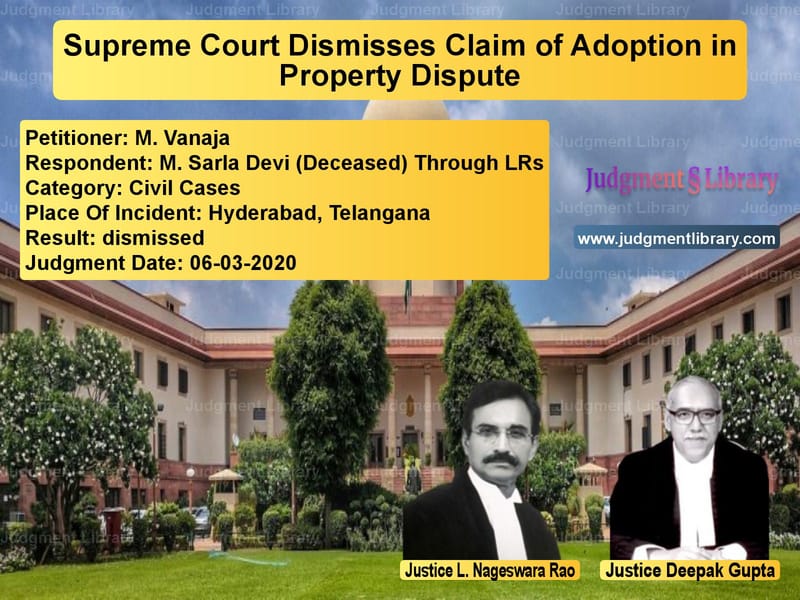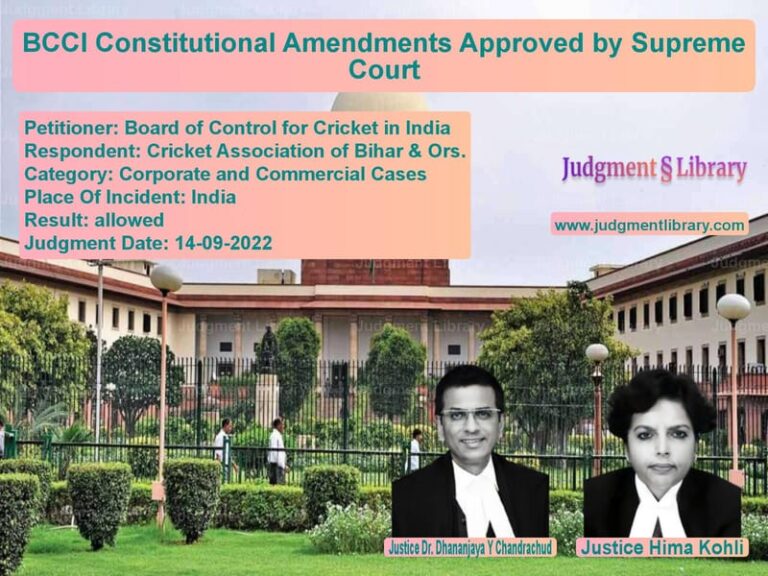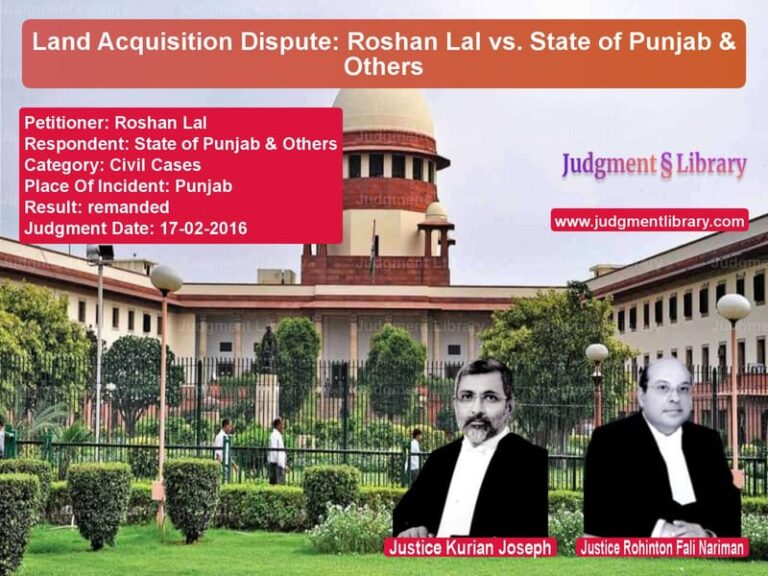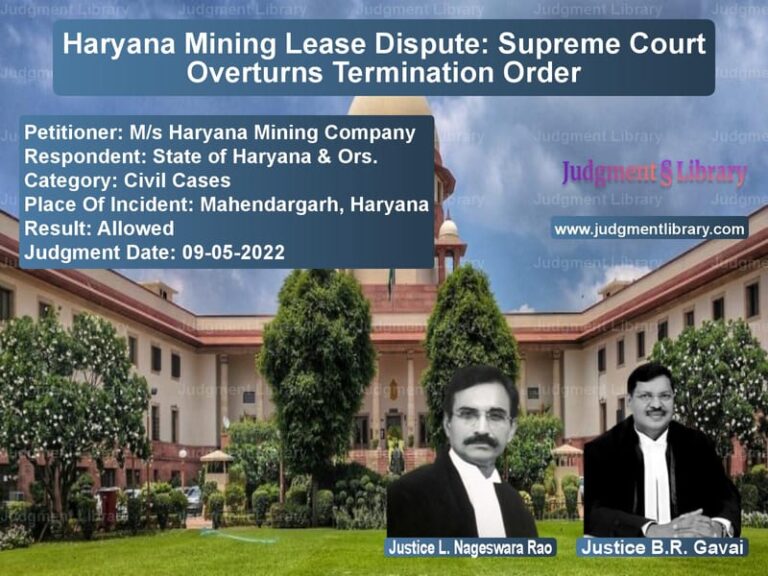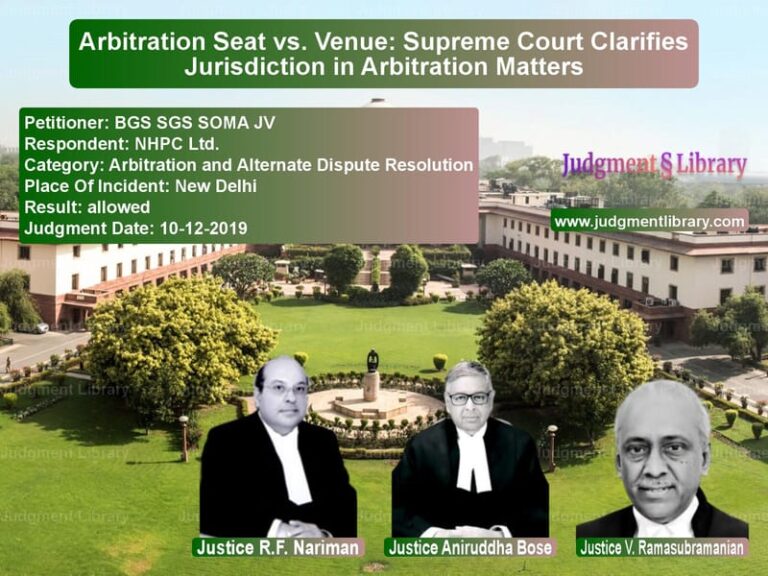Supreme Court Dismisses Claim of Adoption in Property Dispute
The case of M. Vanaja v. M. Sarla Devi (Dead) revolves around the claim of the appellant, M. Vanaja, that she was the legally adopted daughter of the late Narasimhulu Naidu and his wife, M. Sarla Devi. The appellant sought a declaration of her adoption and a partition of the properties belonging to the deceased. The Supreme Court had to determine whether the adoption was legally valid under the Hindu Adoptions and Maintenance Act, 1956.
Both the trial court and the High Court rejected the appellant’s claim, holding that there was no proof of a valid adoption. The Supreme Court upheld these findings, ruling that mere upbringing and documentary references as a ‘daughter’ were insufficient to establish legal adoption without adherence to statutory requirements.
Background of the Case
The appellant, M. Vanaja, filed a civil suit in the City Civil Court, Hyderabad, seeking a declaration that she was the adopted daughter of the deceased Narasimhulu Naidu and his wife, M. Sarla Devi. She also sought partition of the properties left behind by Narasimhulu Naidu.
The appellant’s biological parents passed away when she was young. She claimed that she was raised by the respondents as their daughter and that all school, college, and government records listed them as her parents. The appellant contended that she was named as the nominee in the pension application of Narasimhulu Naidu, proving her status as his daughter.
The respondent, however, denied the adoption, arguing that while they raised the appellant as their own due to family ties, there was never a formal adoption.
Key Legal Issues
- Whether the appellant was legally adopted by the respondents under the Hindu Adoptions and Maintenance Act, 1956.
- Whether upbringing and documentary references as a daughter constituted valid proof of adoption.
- Whether the appellant was entitled to a share in the property of Narasimhulu Naidu.
- Whether the absence of proof regarding the ceremony of adoption was fatal to the claim.
Arguments by the Appellant (M. Vanaja)
The appellant contended that:
- She had been raised as the daughter of the respondents, and multiple official documents, including school and pension records, listed them as her parents.
- The respondent and her husband held a grand wedding reception for the appellant, acknowledging her as their daughter.
- The respondent only denied her adoption due to the influence of other family members seeking to exclude her from the property.
- Under legal precedent (L. Debi Prasad v. Tribeni Devi), a long-standing relationship of parentage should be considered strong evidence of adoption.
Arguments by the Respondents (Legal Heirs of M. Sarla Devi)
The respondents argued:
- The appellant was the biological daughter of the respondent’s sister, but was never legally adopted.
- Merely raising a child does not equate to legal adoption under the Hindu Adoptions and Maintenance Act.
- The adoption claim lacked essential proof, including any evidence of a formal giving and taking ceremony.
- The grandmother of the appellant testified against the adoption claim, stating that the child was only raised by the respondents but never legally adopted.
Supreme Court’s Observations
The Supreme Court carefully examined the provisions of the Hindu Adoptions and Maintenance Act, 1956, and held:
- Section 6 of the Act specifies that no adoption is valid unless made in compliance with statutory conditions.
- Section 7 requires a male Hindu to obtain the consent of his wife before adopting a child.
- Section 11 mandates an actual giving and taking ceremony as an essential element of adoption.
The Court emphasized:
“The absence of a clear giving and taking ceremony as required under Section 11 of the Hindu Adoptions and Maintenance Act, 1956, is fatal to the appellant’s claim. The mere fact that a child was brought up as a daughter does not constitute a legal adoption.”
Final Judgment
The Supreme Court dismissed the appeal, holding that:
- The appellant failed to establish a legal adoption under the Hindu Adoptions and Maintenance Act, 1956.
- Merely treating a child as a daughter is insufficient to confer legal status as an adopted child.
- The trial court and High Court were correct in rejecting the appellant’s claims.
Conclusion
This judgment reinforces the principle that:
- Legal adoption requires strict compliance with statutory procedures.
- Mere upbringing and familial bonds do not create legal rights of inheritance.
- The absence of documentary proof of an adoption ceremony is fatal to such claims.
The ruling ensures clarity in adoption-related disputes, affirming that inheritance rights cannot be claimed without fulfilling the legal criteria for adoption.
Petitioner Name: M. Vanaja.Respondent Name: M. Sarla Devi (Deceased) Through LRs.Judgment By: Justice L. Nageswara Rao, Justice Deepak Gupta.Place Of Incident: Hyderabad, Telangana.Judgment Date: 06-03-2020.
Don’t miss out on the full details! Download the complete judgment in PDF format below and gain valuable insights instantly!
Download Judgment: M. Vanaja vs M. Sarla Devi (Decea Supreme Court of India Judgment Dated 06-03-2020.pdf
Direct Downlaod Judgment: Direct downlaod this Judgment
See all petitions in Succession and Wills
See all petitions in Property Disputes
See all petitions in Specific Performance
See all petitions in Judgment by L. Nageswara Rao
See all petitions in Judgment by Deepak Gupta
See all petitions in dismissed
See all petitions in supreme court of India judgments March 2020
See all petitions in 2020 judgments
See all posts in Civil Cases Category
See all allowed petitions in Civil Cases Category
See all Dismissed petitions in Civil Cases Category
See all partially allowed petitions in Civil Cases Category

